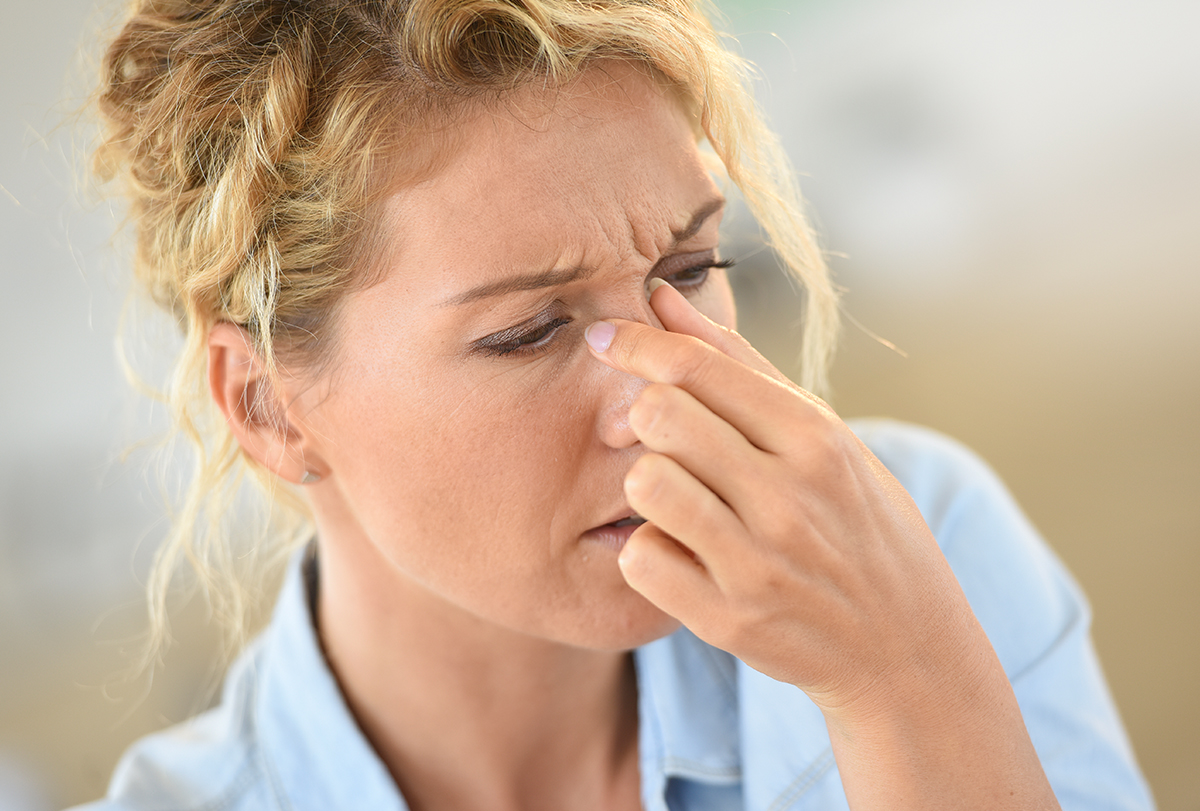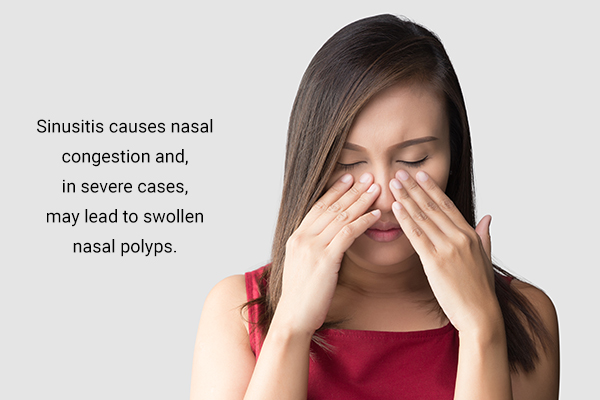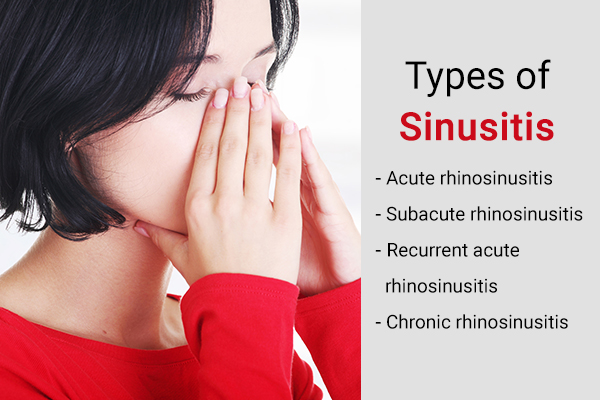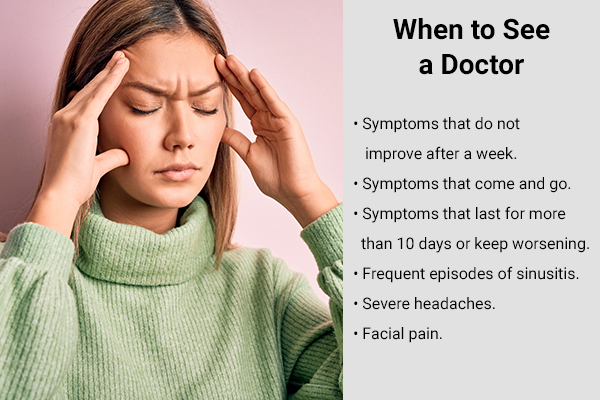In this article:
The sinuses are small cavities located behind the forehead and cheekbones and produce mucus. Sinusitis refers to any inflammation in the sinuses.

Sinusitis usually occurs due to a viral infection. lt may last for a few days or weeks in some people. However, chronic sinusitis can cause recurring inflammation that lasts for years.
Read on to learn more about the symptoms of sinusitis. (1)
Symptoms Indicative of Sinusitis
Common symptoms of sinusitis include:
- Fever
- Nasal congestion
- Chronic headaches
- Post-nasal drip (mucus drainage into the nose and throat) (2)(3)
- Bad breath
- Inability to smell or taste
Your doctor can diagnose sinusitis based on your symptoms and a physical examination. They may ask you to undergo some screening tests to confirm the diagnosis.
Treatment may include antibiotic medications, decongestants, and nasal sprays.
1. Reduced or complete loss of the sense of smell
The inability to smell, or anosmia, is a common symptom of sinusitis. It may occur due to damage to the olfactory nerve or nasal blockage.
Anosmia associated with sinusitis is usually temporary and goes away when the sinusitis is cured. However, in certain cases, chronic sinusitis may cause a reduced ability to smell over time.
Anosmia may also cause an inability to taste as the sense of taste is largely dependent on smell. (4)
2. Difficulty breathing

Sinusitis causes nasal congestion and, in severe cases, may lead to swollen nasal polyps. This hinders your ability to breathe freely from your nose. (5)
Chronic sinusitis can also cause fatigue as a reduced ability to breathe may reduce oxygen supply to the body.
3. Facial pain and pressure
Sinus cavities are located behind the forehead and cheekbones. Congestion in these cavities can exert pressure on your forehead, eyes, and cheeks, causing severe headaches. (6)
4. Darker nasal discharge
Thick, yellow, or green mucus is a classic sign of sinusitis. Mucus discharge associated with a cold is usually white or clear in appearance.
Sinusitis causes colored mucus due to the presence of dead white blood cells in it. (7)
5. Fever, a sign of infection
A fever is your body’s way of fighting off an infection. Common colds generally do not cause a fever, but sinusitis and flu usually do.
If you have a fever above 100°C that does not subside after 3 days, it may be time to visit a doctor. (8)
6. Inflammation of the voice box

Post-nasal drip is a common symptom of sinusitis. It causes drainage of thick mucus from the sinuses into the back of the throat. This mucus can lead to throat irritation and congestion. It can also cause inflammation in your voice box and make you sound hoarse.
7. Meningitis
The meninges are the outer layer of your brain and spinal cord. They help protect the delicate tissue.
Untreated sinusitis can spread to your meninges and cause inflammation. This condition is known as meningitis and can be a serious issue.
Common symptoms of meningitis include high fever, stiff neck, severe headaches, vomiting and nausea, sensitivity to light, and lethargy.
Meningitis is confirmed with a lumbar puncture and other diagnostic tests. It requires treatment from a neurologist. Treatment usually revolves around antibiotic medicines. (9)
8. Brain abscess
A brain abscess is a collection of pus within the brain tissue. It occurs due to the spread of sinusitis from the sinuses to the brain. It is a highly lethal condition that can cause coma or death. (10)
Types of Sinusitis
There are four types of sinusitis:

- Acute rhinosinusitis: Acute rhinosinusitis is a temporary condition with sudden onset. It usually resolves within 4 weeks.
- Subacute rhinosinusitis: Subacute rhinosinusitis lasts for longer than 4 weeks but less than 12 weeks.
- Recurrent acute rhinosinusitis: Recurrent rhinosinusitis is defined as acute episodes of rhinosinusitis that occur multiple times a year (more than 4 times). Each episode usually lasts for more than a week.
- Chronic rhinosinusitis: Chronic rhinosinusitis lasts for more than 12 weeks. (1)
Diagnosing Sinusitis
Sinusitis is usually diagnosed by an ear, nose, and throat (ENT) specialist based on your symptoms and a physical exam. Sometimes other tests are done. These may include:
How to Prevent Sinusitis
Here are a few tips that may help reduce recurrent sinus infections in people suffering from chronic sinusitis:
- Avoid exposure to allergens if you have allergies.
- Clear your nasal passages regularly by blowing your nose, using nasal sprays, and running water in the nasal passages gently.
- Drink lots of water to stay hydrated. This can help reduce the thickness of the mucus.
- Inhale steam regularly, especially during winter.
- Sleep with your head elevated to promote drainage of mucus.
- Wash your hands regularly using soap.
- Avoid touching your face and nose.
Sinusitis and Children
Sinusitis in children is common, and here are a few tips to manage the condition:
- Children younger than 6 months should only be given paracetamol (also called acetaminophen (12) in many countries). (13)
- Children 6 months or older can be treated with both paracetamol and ibuprofen. (12)
- Do not give aspirin to children as it can lead to a severe condition called Reye’s syndrome, which affects the brain and liver. (12)
Complications With Sinusitis
Untreated sinusitis can rarely cause serious complications such as brain meningitis and bone infections. (1)
When to See a Doctor

Consult a doctor if you experience:
- Symptoms that do not improve after a week
- Symptoms that come and go
- Symptoms that last for more than 10 days or keep worsening
- Frequent episodes of sinusitis
- Severe headaches
- Facial pain
- Fever that lasts for more than 3 days
- Multiple sinus infections in a single year
You may be referred to an ENT specialist for treatment.
When seeking treatment, keep these points in mind:
- It is important to consult a doctor for a proper diagnosis and treatment. Do not self-treat yourself with antibiotic medicines or nasal drops.
- Antibiotic medicines should ONLY be taken when advised by a doctor. Make sure to complete the antibiotic course as advised.
- Nasal drops that contain oxymetazoline should only be used when prescribed by a doctor and not for more than 3 days as this can lead to rebound congestion.
- Oral decongestant medicines should be used cautiously in patients suffering from hypertension as they can indirectly increase blood pressure. (1)
Most-Asked Questions About Sinusitis
Are sinus infection and sinusitis the same?
Yes. Sinusitis and sinus infection refer to the same condition. The suffix “itis” means inflammation.
Who is more at risk of getting sinusitis?

- Patients suffering from weakened immunity due to chemotherapy, immune disorders, diabetes, AIDS, etc., are more at risk of developing sinusitis.
- People who suffer from cystic fibrosis and ciliary dyskinesia can easily develop sinusitis as these conditions impair the transport of mucus.
- People who have physical issues in the sinus area such as septal deviations, polyps, and conchae bullosa are also at risk.
- People with any trauma in the area surrounding the sinuses such as fractures are also more susceptible.
- ICU patients confined to their beds may also develop sinusitis due to their supine positions.
- Those who smoke or are exposed to secondhand smoke are more prone to developing the condition. (1)
Is surgery the sole treatment for sinus problems?
If you have a deviated septum, polyps, or some other structural issues, you may be asked to undergo surgery to correct the issue.
Do all sinusitis symptoms indicate sinus infections?
No. Not all sinus symptoms indicate chronic sinusitis. The common cold and other respiratory infections can cause a stuffy nose, difficulty breathing, etc. However, symptoms that last for more than 3 months may indicate sinusitis.
The number of adults with diagnosed sinusitis is 28.9 million. The percentage of adults with diagnosed sinusitis is 11.6%. (14)
Is a runny nose the only symptom of sinus problems?
No, as mentioned above, there are many more symptoms of sinusitis such as facial pain, headaches, dental pain, and fever.
Final Word
Sinusitis is a common condition and may occur due to a viral or bacterial infection. Sinusitis caused by bacteria is more common and can be resolved with antibiotics.
You can also use the preventive measures mentioned above to prevent sinusitis.
- Was this article helpful?
- YES, THANKS!NOT REALLY


